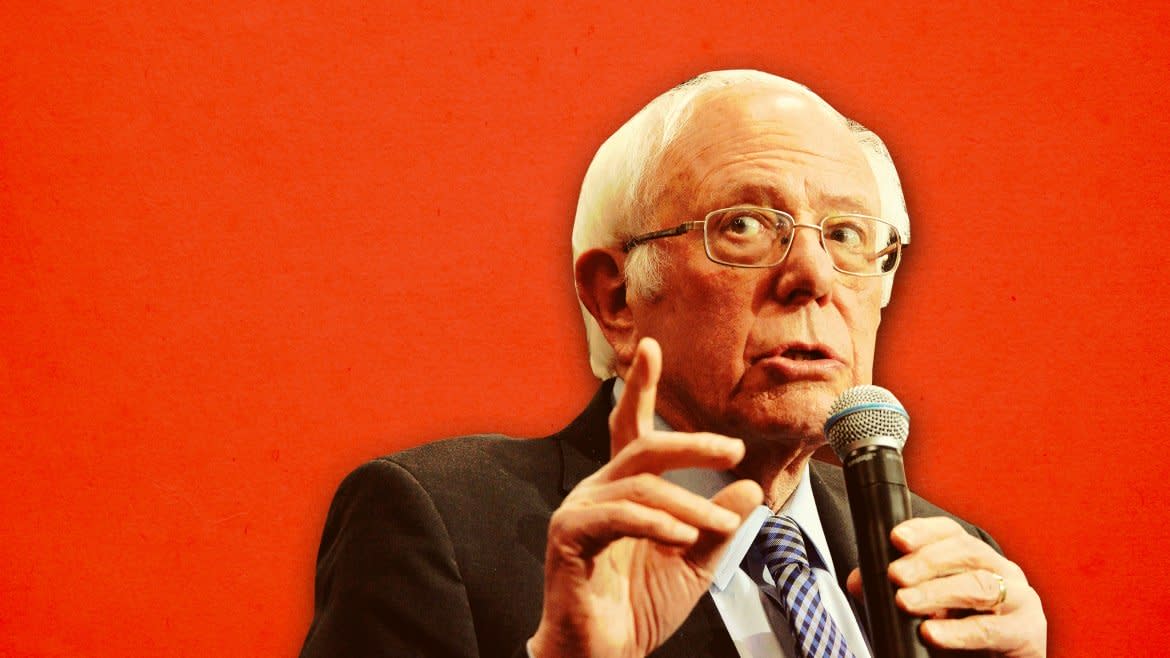Will Bernie Sanders (and Mike Bloomberg) Do to the Democrats What Donald Trump Did to the GOP?

For those of us who watched in horror as Donald Trump rolled over Marco Rubio, Jeb Bush, Ted Cruz, and others to win the GOP nomination, it’s starting to feel like déjà vu all over again. Except this time, the hostile takeover is happening to the Democratic Party.
What else are we supposed to take from the fact that Bernie Sanders, a democratic socialist who finished a very close second in Iowa, is the likely favorite to win in New Hampshire, an outcome that would put him on a clear path to the Democratic nomination?
Like Trump in 2016, Sanders appears to be outmaneuvering more traditional candidates who ostensibly would have broader mainstream appeal. And like Trump in 2016, he benefits from going up against a hollowed-out party establishment that no longer has the moral or statutory authority to determine its own nominee for president.
The Trumpists Boosting Bernie Sanders Might Get What They Wish for—and Regret It
If the establishment is viewed as impotent and antiquated, Sanders is heralded for exciting a new bloc of voters who previously felt disenfranchised by the two-party system. For those who crave entertainment and authenticity, he is a breath of fresh air. While the more moderate candidates are splitting their vote, Bernie has the young socialist vote all to himself.
As was the case with Trump in 2016, the party establishment fears that Sanders can’t win. This is partly because they fear the stigma associated with being a socialist will turn off too many older voters. And it’s party because Sanders has shown no propensity to excite African-American voters—a bloc that has to turn out in large numbers for a Democrat to win. They also fear that his candidacy would also hurt the party down-ballot, possibly tarnishing the Democratic “brand” for a generation.
Of course, a Sanders presidency would—for some in the establishment—be even more scary.
But we’re getting ahead of ourselves. Bernie’s first hurdle is to win the nomination, and again, I’m getting the feeling that I’ve seen this movie before.
In 2016, the GOP was plagued with a collective action problem. Nobody believed Trump could win, but everybody wanted to inherit his supporters, so nobody attacked him. Until it was too late.
Indeed, as Trump was building momentum, Ted Cruz was sucking up to him, while other candidates like Rubio and Jeb trained their fire on each other.
This made a certain amount of sense. Rubio and Jeb were perceived to be in the same lane, and so owning that lane became paramount. Stopping Trump was someone else’s business. And so, he became unstoppable.
If Sanders—a guy who isn’t really a Democrat—somehow goes on to win the Democratic nomination, it will be similar to the dynamic that helped propel Trump, who was only nominally a Republican, to the nomination. We will look back at the bickering between Joe Biden and Pete Buttigieg—two guys who are ostensibly in the same moderate philosophical “division”—as akin to the Jeb vs. Rubio skirmish over who was most qualified to be president: not just a waste of time, but the squandering of an opportunity to stop the real enemy before it’s too late.
If the 2016 metaphor isn’t clear enough, National Journal’s Josh Kraushaar spells it out, noting that Biden is Jeb, Bernie is Trump, Elizabeth Warren is Cruz, Rubio is Buttigieg, Amy Klobuchar is Chris Christie, and Mike Bloomberg is Jeb’s super Pac.
Actually, though, this isn’t a perfect analogy.
Bloomberg—the once-upon-a time-Republican and Independent mayor of New York City, who also happens to be a billionaire—could also become the stand-in for Donald Trump in the 2020 Democratic Party.
Like Trump, Bloomberg sees the Democratic Party as a hollowed-out institution that can be co-opted to advance his own ambitions. He hasn’t exactly played by the rules, kissed all the rings, or paid his dues the way that an aspiring nominee should. Indeed, he won’t even be on the ballot in the early states. Yet, it might not matter. There is now a nonzero chance that Bloomberg could win.
Once upon a time, political parties had the unilateral power to vet and select nominees. Today, they (well, one of them) can’t even pull off running caucuses in Iowa without it turning into a major debacle. Parties such as these are ripe for interlopers to seduce, co-opt, or simply overpower.
That’s part of the story. But it takes a perfect storm for something like this to happen. You need Twitter and cable news. You probably need a billionaire (or someone with a preexisting brand). And you need a weak frontrunner.
Even with a weakened political party, if there were a Barack Obama running for president this year, it’s hard to imagine Democrats would be in this predicament.
Bloomberg’s chances of wresting control of the party are contingent on the establishment’s failure to coalesce around a single normal Democratic candidate. If the early primary states refuse to galvanize around a consensus pick—not an unlikely scenario—he has a shot.
From my standpoint, the potential appeal of a Joe Biden candidacy was that it could lead to a return to normalcy. And, indeed, it might. It’s just that this is the new normal. After three years, the GOP has been completely Trumpified. Will the Bernie Bros take over? Can Bloomberg buy the nomination with slick TV ads on Super Tuesday?
I’m not sure New Hampshire Democrats realize just how much is on the ballot this year.
Get our top stories in your inbox every day. Sign up now!
Daily Beast Membership: Beast Inside goes deeper on the stories that matter to you. Learn more.

